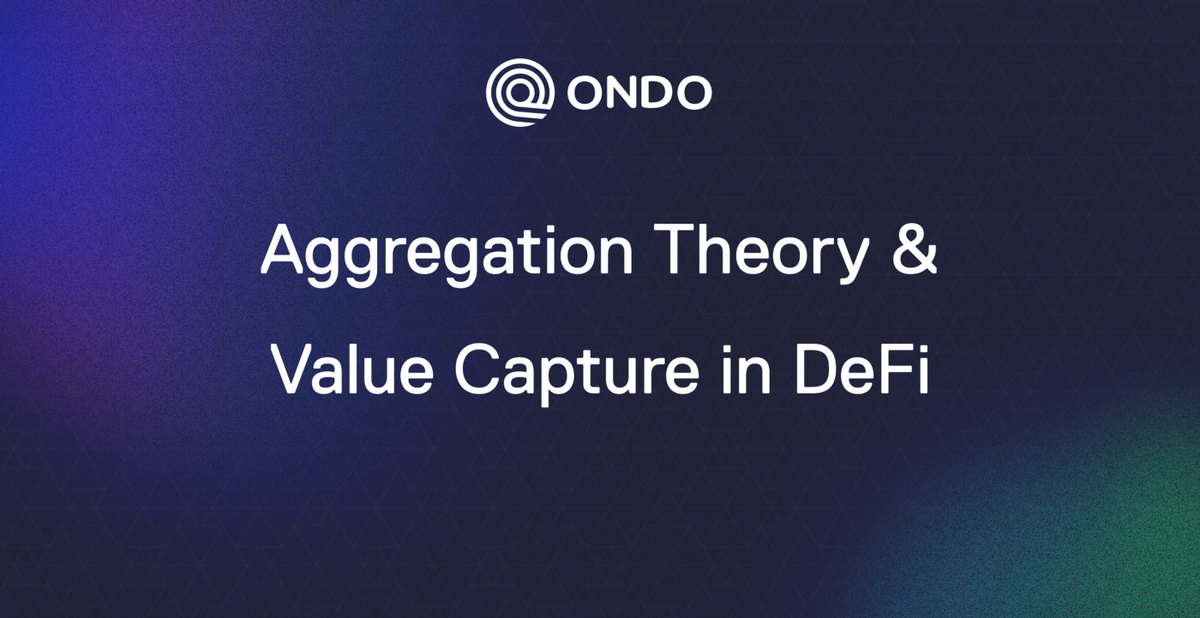Aggregation Theory & Value Capture in DeFi

By Gabriel Bianconi
I’m excited to join Ondo Finance as the Chief Product Officer.
Nathan — Ondo’s CEO and founder — is a long-time friend I really respect. I was fortunate to make a small angel investment in Ondo’s seed round, and now I’m doubling down by becoming part of its talented team.
My decision to join Ondo follows several months of exploring DeFi and thinking deeply about where value in the space will accrue in the long run.
My conclusion is that two-sided capital aggregators (à la Ben Thompson) will capture most of the value in DeFi, and Ondo is well-positioned to become the leading aggregator by building a decentralized investment bank.
Aggregation Theory in Decentralized Finance (DeFi)
In DeFi, we see two primary types of aggregators: capital supply aggregators and capital demand aggregators.
Capital demand aggregators — such as yield aggregators — typically attract investors with the promise of better returns (e.g. gas savings, auto-compounding, efficient capital allocation) and reduced risk (e.g. diversification across opportunities, insurance funds).
Capital supply aggregators, on the other hand, capture value by controlling the distribution to investors and capital. MetaMask became the dominant gateway to web3 — a powerful distribution channel — which in turn enabled the project to effectively scale its trade execution aggregator, MetaMask Swaps.
Such aggregators are particularly powerful when they’re able to bring together a diverse capital base with different preferences. Convex unbundles CRV utility from ownership, and as a result was able to grow its TVL by facilitating an exchange between Curve investors and users.
Much like traditional Internet aggregators — think Google and Facebook’s ad empires, Amazon’s e-commerce platform, and so on — DeFi aggregators hold tremendous power over the parties they aggregate.
A decentralized exchange (DEX) like Uniswap cannot raise fees without risking more forks if it doesn’t directly control its liquidity (e.g. pooled on Ondo and Tokemak) and execution (e.g. routed via MetaMask Swaps and Matcha); the aggregators can easily route around the DEX behind the scenes. Even protocol governance can be at mercy of aggregators; the “Curve wars” are a timely example of aggregators like Convex exerting influence on the governance of the underlying protocol.
Two-sided aggregators have traditionally had an especially strong influence and moat. So, the winners in DeFi will be protocols that are able to aggregate both capital supply and demand.
And a decentralized investment bank is well-suited to become a dominant two-sided capital aggregator in DeFi.
Building a Decentralized Investment Bank
People often conflate investment banking with related services like commercial banking and prime brokerage. After all, TradFi behemoths like JPMorgan provide all these services under one roof.
In its purest sense, investment banking connects capital suppliers with capital utilizers through bespoke offerings. The intermediation of a company raising funds from investors is a canonical example.
Traditional investment banks service their clients in a high-touch, manual, and heavily intermediated way. And at the same time, DeFi presents a new ecosystem of financial activity not well-suited to these players — two incompatible trends.
DeFi, however, also provides novel infrastructure and financial primitives to enable investment banking activities that are automated, composable, and decentralized — the opportunities we’re planning to pursue.
From this perspective, a decentralized investment bank will bring together a number of parties — investors, token issuers, and more — by offering tailored yield opportunities. The latter, at the surface level, are opportunities in other protocols; but more generally, we can think of client-driven on-chain transactions and offerings (such as Ondo’s upcoming Liquidity-as-a-Service offering — more below).
Aggregation will enable the winner in this space to capture substantial value in the ecosystem.
Ondo Finance
Ondo started out by building a novel DeFi primitive for structured products which offer choice between downside protection and enhanced returns. We quickly realized that we could leverage that infrastructure for many other use cases. The first one we’re pursuing is our upcoming Liquidity-as-a-Service (LaaS) offering, which matches DAOs (capital demand) with underwriters (capital supply) to provide liquidity for the DAO’s native token, so that their users can easily trade these tokens in decentralized exchanges.
More broadly, our focus is to build infrastructure that will enable us to service market and client needs in an automated, composable, and tailored way. Tranched structured products can serve many needs — LaaS is a natural and urgent one — but we will continue to expand our suite of tools to address the needs of investors, token issuers, and other ecosystem participants. Our vision evolved into building a decentralized investment bank.
Put simply, Ondo’s role is to:
a) aggregate capital demand (exposures) from across the ecosystem;
b) decompose the associated risks and yields; and
c) bundle, structure, and match those components with a diverse on-chain and off-chain capital supply with respect to its preferences.

Ondo is particularly well-suited for this task.
Our team is proud to be backed by strategic investors that include Pantera, DCG, Genesis, CoinFund, and CMS, as well as key individuals from Goldman Sachs, Binance, Anchorage, Quantstamp, Aave, Compound, TRM, Alchemy, Talos, and many others.
We recently announced a partnership with Fei Protocol to kickstart our Liquidity-as-a-Service (LaaS) offering. Our launch cohort — coming this month — has committed over $100M to provide liquidity on Uniswap through Ondo.
In parallel, we’re building an off-chain asset management arm to bring institutional investors and prime brokers to the Ondo protocol while meeting their regulatory and compliance needs such as KYC/AML. We’re also doubling down on business development to partner and integrate with other protocols, fintechs, neobanks, custodians, and other infrastructure providers. More details coming soon.
Ondo will bring all these pieces together with innovative on-chain and off-chain infrastructure and partnerships. I couldn’t be more excited to join the team and help build this vision.
If you’re interested in getting involved, join us on Twitter.

